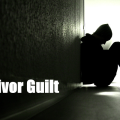
There is no good way to learn that someone you love has decided to end their life. We’ve all experienced that horrifying moment and can likely remember everything about it –what day of the week it was, what we were wearing and what we were doing shortly before our lives would be forever changed. The revelation about my dad’s death actually came to me via the news media and it made my loss all the more traumatizing. Any shred of privacy and dignity were lost.
Our family was very close. We communicated in some capacity every few days, spent holidays together and found reasons to see each other across state borders frequently. Yet, I couldn’t have felt more isolated or alone the day I learned he died. It was a sunny Thursday morning. I remember riding the el train to work at a downtown Chicago PR agency, thinking about what a beautiful day it was. I emailed my cousin on the way to ask when we’d host our family fantasy football league draft, looking forward to another fun season. After going about my usual routine upon arriving at the office, I set off to attend my first meeting of the day. I sat in on a conference call with a client talking about plans for an upcoming product launch event. Little did I know that while I was talking about décor and menu options, the worst possible tragedy was unfolding in my hometown.
Things Would Never Be The Same
I returned to my desk from the meeting and saw my personal email inbox was overflowing with notifications that dozens of friends had written messages on my Facebook wall. I logged on to Facebook to see what the flurry was about and was greeted with the same message over and over, “I’m sorry for your loss.” What were these people talking about?! What did they know that I didn’t, and how did they know it? I tried to call my mom but she didn’t answer. Something in me led me to pull up my hometown newspaper website and that’s what led me to the most horrifying discovery of my life. My dad’s official workplace photo was featured prominently on the homepage with a blazing breaking news headline that said he had been found dead in a local park. My entire office was there to hear and observe my shocked reaction. My mom was miles away from my office, en route to relay the news to me in person and her cell phone wasn’t working.
My dad was an elected official in town and fairly well known. Despite pleas from my mom and the local sheriff to hold on posting the news until they could alert family, they published the story anyway. Soon, the news and story trickled to neighboring community newspapers, local TV stations and other outlets throughout the state. Someone even told me they might have seen it on the state news page rundown in USA Today. Unfortunately, suicide is a very sensational topic. Because of that, it’s not terribly uncommon for a loss to be profiled by the media for one reason or another. Needless to say, this adds an extra layer of complexity for grieving families.
Effects of A Highly-Publicized Suicide
We lost the opportunity to quietly process my dad’s death as a family and decide how and when to share the news with others. Sheer strangers knew just as many of the details as we did, so there was no filtering anything. I’m pretty sure the city also had to situate police cars at the location for a couple days to keep gawkers away. It felt like a circus.
One of the worst parts was when I called the paper to express my anger and disgust at their decision to post about my dad with reckless disregard for our privacy and emotional states. The managing editor couldn’t have been less unapologetic. He said there was nothing they could do because the public needed to know given his position in town. I asked why every other article that mentions the death of someone in town closes with, “names are being withheld pending notification of the family.” Once again, he responded that this is not the case when a public figure is the focus. He couldn’t even say sorry because they were not at fault. Nor did he put on his human being hat and offer me condolences. I hung up on him in a fury. This was extra stress I certainly didn’t need on top of the trauma I was already experiencing. I still can’t forgive them. We denied their requests to cover any further aspects as time passed.
The way I learned about my dad’s suicide is now a part of my story. To me, it’s a big piece. I think about other families whenever I see a suicide covered in the news. My hope is that no one learns about their loved one in the media and that they can block out this extra noise in the wake of their time of sorrow.
As a public relations professional who deals with the media on a daily basis, I was pleased to see changes to reporting guidelines around suicide released this year. According to the Associated Press Stylebook, which serves as a reference on proper grammar, punctuation and language for reporters, “Suicide stories, when written, should not go into detail on methods used. Avoid using ‘committed suicide’ except in direct quotations from authorities. Alternate phrases include killed himself, took her own life or died by suicide. The verb commit with suicide can imply a criminal act.” A small win for all of us…




Becky,
You describe the double-whammy trauma in a manner that makes my nerves feel raw.
I heard the heart-wrenching account of a high-profile suicide when I participated in a suicide survivors support group for ‘new’ survivors. It doesn’t have to be a recent suicide, only that the survivor is ‘new’ to that support group. The group was to meet one evening per week for 6 weeks. After the 6 weeks, the general support group was then available.
During the 2nd session, we were each to individually tell the story of our loved one’s suicide. A woman detailed her husband’s high-profile suicide, which included alleged lies that he told, so she not only had to deal with the shock of his suicide, but she suffered the media questioning her about his business dealings. She was having to defend him while grieving. It was unfathomable.
My son’s suicide wasn’t high-profile, but I ended up using a high-profile name to be able to see my son before the coroner took him away. My son hanged himself from a huge oak tree limb in vacant land adjacent to our home, which was across a street from our property. The cops wanted to search my son’s bedroom in our home. I told them no. They insisted they needed to search his bedroom. I kept telling them no. I waited near the tree, about 50 feet away, for about 4 hours for them to bring my son down from the tree. They told me to go home. I told them that I was waiting to see my son up close and to touch him. They told me that isn’t happening. The cops kept bugging me about searching his bedroom and a detective told me that after I let them search his bedroom, that they will let me see him. Otherwise, they said I wouldn’t see him. I was *#&%@! angry at this cruelty. I could barely speak because I was near utter collapse, but I then told the cops to call Sheriff J___ C____ and I said that *he* would let me see my son. From that point, I never heard another request to search my son’s bedroom. And they let me see my son. But this was a terrible way to treat a grieving mom. Heartless!